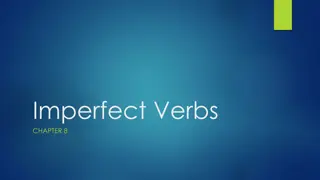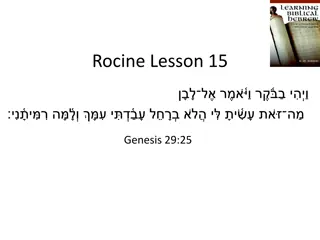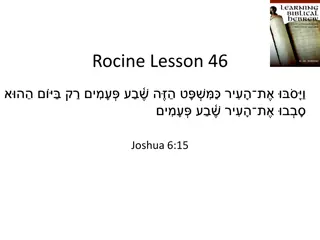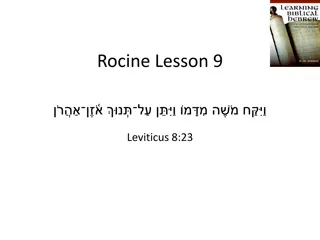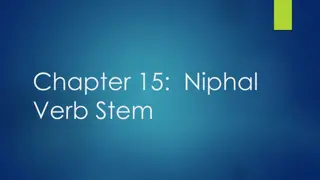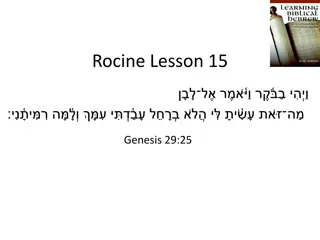Ch. 13 Qal Pariticples
Dive into the world of Hebrew grammar through chanting exercises covering nouns, pronouns, and verb forms. Explore masculine and feminine nouns, personal pronouns, and verb tenses like Qal Perfect. Enhance your language skills with these engaging chants and improve your understanding of fundamental Hebrew concepts.
Download Presentation

Please find below an Image/Link to download the presentation.
The content on the website is provided AS IS for your information and personal use only. It may not be sold, licensed, or shared on other websites without obtaining consent from the author.If you encounter any issues during the download, it is possible that the publisher has removed the file from their server.
You are allowed to download the files provided on this website for personal or commercial use, subject to the condition that they are used lawfully. All files are the property of their respective owners.
The content on the website is provided AS IS for your information and personal use only. It may not be sold, licensed, or shared on other websites without obtaining consent from the author.
E N D
Presentation Transcript
as one brothers dwell How good and pleasant it is when brothers live together in unity! and how pleasant how good behold (repeat) Chorus: How good when brothers live together in unity! How good when brothers live together in unity!
4.L. Sing: Shema lullaby (Deut. 6:4) https://www.youtube.com/watch?v=pIOpZ9fQLbU&t=0s&list=PLnNXzYjQerJia_ 8yTy8OrM2K-BiN5OEup&index=2 or search Youtube for: Shema Lullaby Judy Ginsburgh Shabbat Shalom Medley https://www.youtube.com/watch?v=- MBgACM_LcE&list=RDEMSL0J_ngrs5U8EoQWZITH5w&index=9
5.I. Oseh Shalom He who makes peace in his high places may he let peace descent on us and on all Israel and say, say: Amen.
5.I. Oseh Shalom May he make peace, may he make peace Peace for us and for all Israel
Vanquishing the Vowel Long ( ) BAh -- Q me ( ) Bay er (Y d) Bee -- req Y d ( ) Bow lem (V v) Booh req (rule) Short bAh -- Pata ( ) Beh Segh l (Y d) Bi(t)-- req Bow-- Q me at f Booh-- Qibb Beh vocal ev Half Bah -- at f-pata Beh at f-Segh l Vowel Type A - type E - type I - Type O - Type Bow-- at f Q me U - Type - ( ) Bah-v silent ev
Qal Perfect Chant 1 CP we guarded 1CS I guarded 2 MP you (m.) guarded 2 MS you (m.) guarded 2 FS 2 FP you (f.) guarded you (f.) guarded 3 MS 3 CP they guarded he guarded 3 FS she guarded
Noun Chant Masculine Feminine Dual:
Chant Personal Pronouns 1stcommon I we 2ndmasc. you (m.) you /ye / you all (m.) 2ndfem. you (f.) you / ye / you all (f.) 3rdmasc. he / it they (m.) 3rdfem. she / it they (f.)
Chant: Preposition with Pronominal Suffixes 1 CS in me 1 CP in us 2 MS in you (m.) 2 MP in you (m.) 2 FS in you (f.) 2 FP in you (f.) 3 MS in him 3 MP in them (m.) 3 FS in her 3 FP in them (f.)
Demonstrative Pronouns: this and that This / these that / those who, which / /
Qal Imperfect Chant 1CS 1CP 2MP 3MP 2MS 2FS 2FP 3MS 3FS 3FP
9. F. Chant: Qal Perfect Weak Verb Ayin-Y d/V v L med-H to rise to build to give (3fs) 1CS 2MP 3CP
10.B. Chant: . P position--weak guttural Regular P -N n, P -Y d, P - lef P -Guttural 2MS/3FS
10.C. Chant II. Ayin position weak guttural: Regular Ayin-Y d/V v Ayin guttural Double Ayin 2MS/3FS
10.D. Chant: III. Lmed position: Regular L med-H L med-guttural L med- lef 2MS/3FS
11. D. Learn the following chant for : Imperative chant 2ms [you, m.s.] guard 2mp [you m.p.] guard 2fs [you, f.s.] guard [you f.p.] guard 2fp
12. A. Introduction to Infinitives Inf. Construct: (note it is the same as the 2ms Imperative) Inf. Absolute:
13. C. Participle chant: Qal Active Participle Singular Plural Masculine Feminine /
13. C. Participle chant: Qal Passive Participle Singular Plural Masculine Feminine
13. A. Introduction to Participle: Participles are verbal adjectives. In English we turn a verb into a participle by adding a ing to the verb (e.g. sitting, running, jumping, lifting).
3 Usages of Participle: We have attributive use participles which as adjectives modify the noun that they come with (e.g. the sitting student or the running student). The predicate use is formed by adding the helping verb is (e.g. the student is sitting or the student is running). Finally, in English when we use a verb plus ing ending for a noun it is called a gerund or substantive (e.g. Sitting is the new smoking or Running is easy).
Qal Active / Qal Pasive Participles In Hebrew the participle matches its noun in gender and number There are Qal Active participles (e.g. Rebekah was seeking Madame Wisdom). There is also a Qal Passive participle (e.g. Rebekah was being sought by Madame Wisdom).
13. B. Formation of the Qal Active and Qal Passive Participles for Strong Verbs Qal Active is generally formed with a lem after the first consonant and a er after the second consonant (e.g. meaning keeping/guarding; simply say oh- ey). The Qal Passive is generally formed with a q me under the first consonant and a req following the second consonant (e.g. meaning being kept/guarded; simply say ah-ou).
Participle Endings: The masculine plural is formed by simply adding the normal masculine plural ending. The feminine singular is formed in two ways. Sometimes the normal can also signal a feminine singular. ending is added but a The feminine plural uses the normal suffix.
13. C. Participle chant: Qal Active Participle Singular Plural Masculine Feminine /
13. C. Participle chant: Qal Passive Participle Singular Plural Masculine Feminine
Parsing format: Qal Active Ptc. m.s. from meaning keeping Qal Passive Ptc. m.s. from was being kept
13. D. Formation of the Qal Active Participles for Verbs QAL ACTIVE PARTICIPLE FORMS Verb Masc. Sg. Masc. Pl. Fem. Sg. Fem. Pl.
13. D. Formation of the Qal Active Participles for Verbs Verb Masc. Sg. Masc. Pl. Fem. Sg. Fem. Pl.
13. D. Formation of the Qal Active Participles for Verbs Verb Masc. Sg. Masc. Pl. Fem. Sg. Fem. Pl.
13. D. Formation of the Qal Passive Participles for Verbs QAL PASSIVE PARTICIPLE FORMS Verb Masc. Sg. Masc. Pl. Fem. Sg. Fem. Pl.
13. D. Formation of the Qal Passive Participles for Verbs Verb Masc. Sg. Masc. Pl. Fem. Sg. Fem. Pl.
Attributive Usage: When a participle is used as an attributive adjective it often follows the noun matching the noun it modifies in number, gender and definiteness. You can add the pronominal indicators who or which or that as well (e.g. the child who ran).
Attributive Examples For the LORD your God is a devouring fire (Gen 16:13) She gave this name to the LORD who spoke to her (Deut 4:24)
2. Predicate Usage: The predicate use of the participle predicates something to the noun and while it matches in gender and number, it never takes the definite article. It may come before or after the noun that it is predicating something to (e.g. the child is running).
Predicate Examples Lot was sitting in the gate of Sodom (Gen 19:1) The men are shepherds of livestock (Gen 46:32)
3. Substantive Usage: When the participle is taken as a substantive or noun it does not modify or match a noun. Because it is acting like a noun it can be the subject or object of the verb. It also can take prepositional prefixes and pronominal suffixes Kelly notes that vocational nouns are often verbal nouns (e.g. [priest], [judge], [scribe], [seer], [gatekeeper], [healer/doctor] and [redeemer]).
Substantive Examples and he is ruler over all the land of Egypt who forsake the paths of uprightness to walk in the ways of darkness (Pro 2:13 NRS) (Gen 45:26) (Prov 2:13)
Since no tense is indicated by the participle itself, participles can also be used as verbs in the past, present and future tenses. They match their subjects in gender and number and often as a normal verb precede the subject of the sentence (VSOM). The time of the participle must be derived from the contextual indicators.
One hint is that often is used to indicate immediacy that something that is about to happen. Sometimes the participle is used with the verb indicating the progressive nature of things. Waltke/O Connor (628) sites: he was standing beside me.
13. F. Chapter 13 Hebrew Vocabulary sword 412 sea, lake 396 to go down 380 silver 402 altar 401
13. F. Chapter 13 Hebrew Vocabulary to answer 413 now, then 433 troops, military host 485 spirit, wind, breath 378 official, commander, prince 421
13. F. Chapter 13 Hebrew Vocabulary sword sea, lake to go down silver 412 396 380 402
13. F. Chapter 13 Hebrew Vocabular altar to answer now, then troops, military host 401 413 433 485
13. F. Chapter 13 Hebrew Vocabulary spirit, wind, breath official, commander, prince 421 378
12. D. Chapter 12 Qal Infinitive Vocab / Lord, master to give birth, beget who, how? 439 495 424
12. D. Chapter 12 Qal Infinitive Vocab justice, judgment to strike, hit mouth, opening again, still, yet 421 500 497 490


